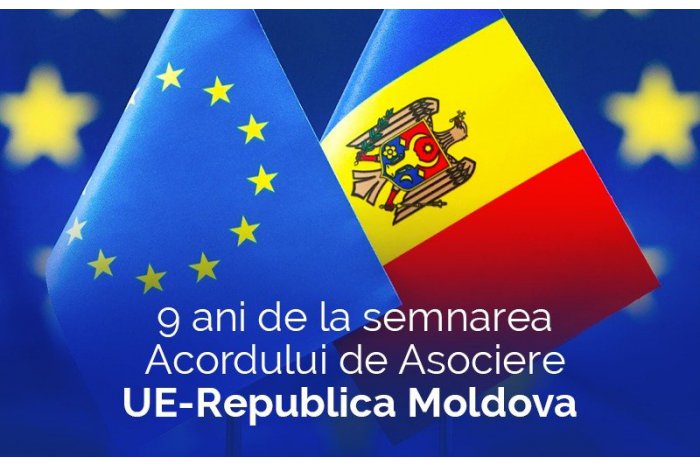
Nine years pass since signing of Moldova-EU Association Agreement
Chisinau, 27 June /MOLDPRES/ - Moldova today marks the ninth anniversary of the signing of the Association Agreement with the European Union. This moment opened new opportunities and perspectives of development. One of the principal advantages of the Association Agreement is Moldova’s enhanced access to the single European market.
The agreement represents a new legal framework, established for the advancement of the relations between Moldova and EU in all sectors of interest. It includes the creation of a Deep and Comprehensive Free Trade Area (DCFTA), the goal of which is to stimulate the economic integration and the political association between Moldova and the European Union.
Thus, during those nine years since the signing of the Agreement, EU has consolidated its position of Moldova’s principal commercial partner, with about 63 per cent of the Moldovan exports going to the European market in 2022, reaching 2.6 billion euros. The number of companies exporting to EU also grew and account for over 70 per cent of the overall number of companies exporting to the EU market, especially to Romania, Germany, Italy, Poland and the Czech Republic.
Through the Association Agreement, Moldova has benefited from financial and technical support on behalf of EU, with a significant impact on the economic growth, creation of jobs and improvement of the citizens’ living standards. During years, Moldova has proved its firm commitment to the European values and made notable progress in the implementation of the Association Agreement and EU gave assurances that it would continue backing Moldova on its European integration way.
During nine years since the signing of the Association Agreement, Moldova has made important steps on the way of getting closer to EU. Thus, one year ago, the country got the status of state candidate for accession to the European Union. At the same time, nine conditions were submitted to the Moldovan authorities to switch to the next phase – the one of negotiations, in the process of European integration.
The Moldova-EU Association Agreement was signed on 27 June 2014 and ratified by the Moldovan parliament’s plenum on 2 July 2014. The European Parliament ratified the Association Agreement at its plenary meeting from 13 November 2014. As many as 535 European MPs voted for the ratification, 94 – against and 44 lawmakers abstained from voting.
PHOTO // Deputy Prime Minister, European partners in The Hague discussed European path and regional security
Elections to be held in Mașcăuți and Sărătenii Vechi
New electoral commission of autonomy formed in Gagauzia
Moldova signed Convention on establishment of International Claims Commission for Ukraine
PHOTO // President at diplomatic conference in The Hague
VIDEO // Moldova, Ukraine to simultaneously advance on path to EU membership; Moldovan, Ukrainian presidents have meeting in The Hague
VIDEO // Moldovan PM says independent judiciary fundamental condition for economic growth, welfare of citizens
Moldovan parliament speaker warns Moldovans from Russian Federation about real risks of forced recruitment, says Russia needs cannon fodder
Moldovan parliament speaker conveys message to Putin: 'History does not repeat, the empire cannot be reincarnated'
Moldovan president has talks with Greek PM
Moldova and Sweden strengthen bilateral cooperation in key areas
Draft law on mandatory health insurance funds for 2026 passed in first reading: more funds for medical services and compensated medicines
State Social Insurance Budget Law for 2026 approved in first reading: indexed pensions and increased allowances
President of Cyprus, at meeting with Moldovan counterpart, says country's goal for Moldovan citizens to enjoy benefits of European integration as soon as possible
Moldovan president outlines foreign policy priorities for 2026 at assembly of Moldovan ambassadors
Foreign policy priorities set at ambassadors' meeting in Moldova; Moldovan president says there is only one realistic strategy for survival as democratic, free, sovereign state for Moldova: EU membership
Anti-corruption prosecutors Vitalie Ivanov and Victor Cazacu heard as part of integrity assessment
Romania to host trilateral meeting of foreign ministers in 2026
Energy Minister: 2025 - turning point. Moldova decisively strengthened energy security
VIDEO // Moldova, Romania strengthen strategic partnership: economic cooperation, Infrastructure's development as priorities for 2026
Moldovan agriculture minister explains why shelf quotas are not enough
Romania's foreign affairs minister comes to Chisinau on December 22
PHOTO GALLERY // ''Covorul Dorului'' National Fair of Carpets, 12th edition
Human rights integrated into medical training at Nicolae Testemitanu Medical University of Moldova
Winter Solstice 2025: shortest day, longest night of year marks beginning of astronomical winter
PHOTO// Scientific community of Moldova honored at Researchers' Gala 2025; Moldovan education minister says researchers' work has future at home
Logistic routes blocked in southern Ukraine following recent attacks; shipments, including humanitarian aid, to be diverted through Moldova
Crossing Tudora-Starokazacie border point to Belgorod-Dnestrovsk permitted for all travelers
Free vouchers for professional training; Moldovan labour minister says National Employment Agency intervenes when women want to improve skills
TOP 5 achievements in culture in Moldova: investments in youth, infrastructure, heritage

